- Home
- John Bellairs
The Treasure of Alpheus Winterborn Page 3
The Treasure of Alpheus Winterborn Read online
Page 3
“What is it?” Anthony asked. “It looks like it’s gold.”
“It is gold. It’s a ten-dollar gold piece. Back in the old days, they used gold coins the way we use paper money today. This one’s rather worn, but I would imagine it’s still worth at least ten bucks at your local bank.” Again, Miss Eells smiled warmly at Anthony. She was thinking, Here is a boy whose mother has brought him up to be selfish and suspicious. She talks money money money to him, day and night. You’d think he would have stuffed this coin into his pocket the instant he saw it. Instead, he brings it to me.
Anthony eyed the coin hungrily. “I’ll take it and put it in the library fine box if you want me to,” he said in a forlorn voice.
“Fine box, my eye!” said Miss Eells, laughing. “Here, Anthony, take it! Finders keepers is what I say. It’s yours.”
Anthony could hardly believe his ears. “R-really? Honest to God?”
Miss Eells nodded. “Honest to God. I wouldn’t try to spend it at the five-and ten-cent store, but if you take it to the bank, I’m sure they’ll cash it for you. If they have any questions about how you got it, tell them to call me.”
“Gee, thanks,” said Anthony, beaming. He stuffed the coin into his pocket.
“Now then, what else have we here?” said Miss Eells as she picked up the scroll of paper and carefully unrolled it. The paper turned out to be three small sheets of onionskin paper all rolled up together. The sheets were covered with square, precise lettering.
“What is it?” asked Anthony eagerly.
Miss Eells squinted at the writing. Then she opened the middle drawer of her desk and took out a magnifying glass. “Ah, that’s better. Hm... hmmm... it seems to be a message from good old Alpheus Winterborn. Want to hear what it says?”
“Sure!”
“Okay. Here goes: ‘I, Alpheus Winterborn, swear that the following is a true statement. It is generally thought that I found nothing of any value during my visits to Egypt and the Holy Land. This is not true. On one trip, and under highly unusual circumstances, I discovered an object of great antiquity, an object that was at one time very sacred to one of the ancient peoples of the earth. It is an object that was thought to have perished utterly, without a trace. I returned to America with a part of that object—a part that, I daresay, is quite valuable, worth many thousands of dollars.
“ ‘At first I thought that I would present my discovery to a museum. But I considered further, and at length concluded that I would not. The world has rejected my efforts in the field of archeology. Well, I reject the world, and I challenge it to match wits with me. I have hidden the object I found, but I have left clues that, when read properly, will lead to its discovery. The person who finds this message is well on his way to finding the treasure I speak of. But I warn him, there’s many a slip ‘twixt the cup and the lip.
“ ‘Here, then, is the first clue. It is a poem written by myself and titled ‘Mirror, Mirror.’
“ ‘Acorns up
And windows over
That will put you In the clover.
“ ‘How high is up?
The top of the roof.
Mind the prancing and the pawing
Of each little hoof.
“ ‘Good hunting. Alpheus T. Winterborn.’ “
“Well!” exclaimed Miss Eells as she laid the papers down. “Whatever on earth do you make of that? Eh?”
That hungry look was back in Anthony’s eyes again. The note had mentioned a treasure, a treasure worth thousands of dollars. That interested him very much. “It’s like a treasure map,” said Anthony eagerly. “I mean, if we figure out what the poem means, we’ll find the treasure he’s talking about, won’t we?”
Miss Eells glanced at him skeptically over the top of her glasses. “Maybe we would, and maybe we wouldn’t. I hate to throw cold water on your schemes, but there’s another side of Alpheus Winterbom’s personality that you ought to know about. He was a great practical joker.”
Anthony’s heart sank. He knew what practical jokes were—dribble glasses and flowers that squirted water and stuff like that. “How—how do you mean, Miss Eells?”
“I mean, my friend, that this could all be a hoax. A wild-goose chase. That poem, for all you know, may be utterly and totally meaningless.”
“Yeah, but what if there really is a treasure?” Anthony insisted.
“What if there’s cheese on the moon?” said Miss Eells sarcastically. “What if there’s pie in the sky? Anthony, I don’t want to seem harsh, but you don’t know what that old coot was like.”
Anthony suddenly felt depressed. “Are you sure it’s a joke?” he said at last.
“Of course not. Good Lord, I’m not sure of anything in this life. Nobody is. I’m just telling you what I think because—well, because I don’t want you to do a lot of work for nothing. I don’t want you to be disappointed.”
Anthony didn’t seem to be listening to Miss Eells. He was staring at the little bundle of papers that lay under her hand. “Could—could I have the message?” he asked hesitantly. “I wouldn’t spend a lot of time working on it, I promise. I just wanna—sort of look at it for a while.” He looked hopefully at Miss Eells and waited for an answer.
Miss Eells burst out laughing. “Oh, Anthony! You’re about as good at hiding your feelings as I am! If I give these papers to you, you’ll go straight home and slave over them till you think you’ve solved the riddle. Won’t you?”
Anthony’s face turned red. He stared at the floor and said nothing.
“Here,” she said, shoving the papers across the desk. “Take them. And if you ever figure out what that idiotic poem means, let me know. Okay?”
“Gee, thanks, Miss Eells!” said Anthony with a grin. He scooped the papers up and stuffed them into his shirt pocket. “Thanks a whole lot. I really mean it.”
“Don’t mention it,” said Miss Eells, chuckling. She sat back in her chair and folded her arms. “My, my!” she said thoughtfully. “What a thing to find! Now we know what old Goofyblotz was doing with some of his time during that week he spent alone here in the library. He was whittling a hole in that silly moon thing so he could hide his poem and the coin. Speaking of which,” she said, glancing hastily at her watch, “if you want to get that gold piece changed today, you’d better hurry. It’s a quarter to three, and the bank closes at three.”
“Is it okay if I go? I could come right back afterward.”
“Oh, there’s no need for you to come back today, Anthony. Business is rather slow. Go on out and have a game of ball.”
Anthony jumped up. “Gee, thanks again, Miss Eells!” he said. And then he was off on the dead run for the bank.
CHAPTER 4
When Anthony got to the bank, he was all out of breath. He stopped on the sidewalk outside, and as he stood there panting, he wondered whom he ought to see about cashing the ten-dollar gold piece. He thought about Miss Grace, the kind and helpful teller who always took care of his savings-account problems for him. He hoped that she would be there today.
But when he got inside and looked around, Anthony saw to his dismay that Miss Grace was not where she usually was. In the past, she had always been in the teller’s cage at the end of the left-hand counter. Instead, a tall, gloomy, balding man with a little thin moustache was standing behind the counter with his side turned to Anthony. He was shuffling through some papers and scratching his upper lip. He seemed annoyed about something. Anthony was disappointed, and a little frightened. Would this man be willing to help him? He didn’t look very friendly. Anthony approached the counter timidly and said, “Excuse me, sir, but could you help me?”
The man went on shuffling papers. He didn’t seem to hear Anthony at all. Anthony spoke again in a louder voice. “Excuse me, sir, could you help me?”
Finally the man looked up at Anthony in an annoyed way, the way people do when they have been interrupted. “Yes? What is it?”
“Uh, excuse me, but—but...”
“Oh, come to th
e point, for heaven’s sake!” the man snapped. “I haven’t got all day.”
Anthony’s face started to get red. He felt like turning around and running out of the bank. But he took a deep breath instead and dug his hand into his pocket. He pulled out the ten-dollar gold piece and shoved it across the counter to the man. “M-Miss Eells down at the library gave me this,” he said, talking very fast and staring hard at the counter. “And—and she says I can have it and that you would give me ten dollars’ worth of real money for it. You can call her up and ask her if you don’t believe me. It’s really okay, it really is.”
The man reached out and picked up the coin. And as he did this, his whole expression seemed to change. His face turned pale, and the lines around his mouth grew hard. “Where did you get this?” he asked sharply.
Anthony was startled by the way the man acted. Then he began to get frightened. Was it a counterfeit coin? He had heard somewhere that you could be put in jail for passing counterfeit money. “It’s—it’s real,” he stammered. Then he added in a weak voice, “Anyways, I think it is. Miss Eells gave it to me. You could call her up if you want. She says it’s okay.”
The man said nothing. He turned the coin over in his hand. He seemed to be thinking. “Excuse me, young man,” he said in a cold, dignified voice. “If you don’t mind, I have to take this into the back room. We have an expert here, a gentleman who knows a good deal about coins, and he may be able to tell us if—if this coin is worth more than it seems to be worth. Do you mind if I check with him?”
“Gee, no,” said Anthony. “Go ahead.” His face suddenly brightened at the idea that he might have a rare coin.
“I’ll be back in a few minutes,” said the man. He turned and left the teller’s cage. Anthony heard a door open and close behind the high wooden partition. Now all sorts of doubts and fears came flooding into his mind. What if this man just pocketed the coin and pretended that Anthony hadn’t given it to him? Anthony’s mother was always warning him against people’s tricks, telling him to count his change and watch out for anybody who offered him something for nothing. It scared Anthony to think that he might be swindled by this dignified, businesslike man. But there was nothing he could do now. The coin was gone. He just had to wait and see.
Five minutes passed. It seemed like hours to Anthony. Finally, the man came back. He smiled coldly at Anthony and shoved a crisp, new ten-dollar bill out through the bars of the teller’s cage.
“Here you are, young man. I’m sorry to have kept you waiting so long, but I wanted to make absolutely sure that we were giving you a fair shake. Unfortunately, the coin is a rather ordinary one, as ten-dollar pieces go. Also, it is rather worn, and that reduces the value of such things. But ten dollars in United States money is ten dollars, after all. It’s legal tender. Here you are, and as I said before, sorry to have kept you waiting.”
“Thanks,” Anthony mumbled as he took the bill. He didn’t know whether to be happy or sad. Had the man cheated him? He couldn’t tell. On the other hand, ten dollars was a lot of money as far as he was concerned. He pulled the bill back and forth between his fingers and listened to it crackle. He was already thinking about the things he would do with this money. He would hide it away in his desk and then spend it—slowly—on movies and ice cream and soda pop and candy. Sighing with satisfaction, he took out his wallet and slid the bill into it. As he was leaving the bank, it occurred to him to wonder again why the man had acted so funny when he handed him the coin. He glanced back toward the teller’s cage. But the cage was empty. The man was gone.
A couple of days later, Anthony was in the West Reading Room of the library trying to raise one of the long, heavy sash windows. The window was swollen with the heat and the damp, and it just wouldn’t budge. Anthony strained and struggled and grunted and groaned, but it was no use. “Oh, the heck with it!” he said out loud. He stepped back, put his hands on his hips, and glared disgustedly at the cranky window.
Miss Eells was at the other end of the room fanning herself with a copy of Better Homes and Gardens. There was no one in the library but Anthony and her. “Give it up, Anthony,” she said with a sigh. “That blasted window won’t budge until this heat wave breaks. How long has it been this hot? I swear I can’t remember when I was cool.”
Suddenly Anthony gave a loud exclamation. “Hey, Miss Eells! Would you come here for a minute?”
Miss Eells looked startled. “Sure,” she said, and she got up and walked to the window where Anthony was standing. “Whatever is the matter?”
Anthony pointed at a man who was walking along on the sidewalk in front of the library. “That’s the man,” he said. “The guy that gave me the hard time about the coin I found.”
“Oh, him!” said Miss Eells. “Don’t you know who he is?”
Anthony shook his head.
“That’s Hugo Philpotts. He’s a sort of a bigwig in this town, though he’s not as big a wig as he’d like to be. You say he was standing behind the counter in the bank?”
“Yeah. He was where Miss Grace always is.”
“Huh! Well, I must say that’s odd. You see, he’s not a clerk in that bank. He’s a vice-president. Vice-presidents don’t usually stand behind the counters and change money. They sit in big offices with secretaries and phones and stock tickers and everything. I wonder what he was doing behind the counter.”
“Maybe he was checkin’ up on somebody,” Anthony said. “Maybe he thought one of the clerks was stealin’ money, and so he wanted to find out for sure and catch the guy red-handed.”
Miss Eells looked amused. “Maybe so,” she said. “It certainly would be like him. He’s a crafty, cold, sneaky old so-and-so, and he’s always suspecting somebody of trying to do him out of a nickel. I hate to speak so harshly of one of the pillars of our community, but I’m afraid it’s the truth. By the way, did you know he was related to our dear Alpheus?”
Anthony looked surprised. “To Mr. Winterborn?”
Miss Eells nodded. “Mm-hmmm. The same. Alpheus’s sister married a man named Philpotts, and Hugo is their child. Of course ‘child’ is not the word—Hugo is nearly fifty now. But Alpheus Winterborn was his uncle. And in a funny way, Hugo has been living in his uncle’s shadow for most of his adult life.”
“I don’t get what you mean.”
“I mean just this: Alpheus Winterborn died in 1929, when Hugo was twenty. He left most of his money to his son, Alpheus Junior, the one who is now president of the Winterborn Silverware Company. He hardly left anything at all to his sister’s family—he and his sister were on the outs at the time he died, but I forget why. At any rate, Hugo has always felt that he ought to have gotten more money from his uncle. He’s felt cheated for a long time now, and I really think he believes that if old Alpheus had done what he ought to have done, he, Hugo, would be a millionaire now.”
“It sure would be nice to have a million bucks,” said Anthony dreamily.
“Maybe. But as my late father used to say, if a bullfrog had wings, he wouldn’t bump his rear end on the ground.”
Anthony laughed.
“Oh, by the way,” Miss Eells said, “I hope you noticed what a nice job I did with that little wooden moon. It’s all back in place again. No one would ever know it had been knocked down.”
Anthony peered down toward the fireplace. “Gee, it looks great, Miss Eells. How did you get it back on?”
“Oh, it wasn’t much of a problem. I just glued the two halves together. There’s a little plug on the bottom of the moon, and it fits into a hole on the cornice. By the way, there wasn’t a trace of glue on the plug. Alpheus must’ve just balanced it up there so some lucky person would knock it off accidentally.”
“I don’t feel so darned lucky,” grumbled Anthony. “I still haven’t figured out what that crummy poem is all about.” He had read the poem over quite a few times since he found it, but he hadn’t been able to make head or tail of it. He had even held each of the onionskin sheets over the flame of a candle for
a while, just to see if there was any secret writing on them. There wasn’t. “Did you tell anybody else about the stuff I found?” he asked anxiously.
Miss Eells pursed her lips disdainfully. “No, indeed. Do you think I want everybody in God’s creation poking around my library looking for hidden treasures?”
“You still don’t think there’s a treasure at all, do you, Miss Eells?” said Anthony.
Miss Eells smiled sadly at him. “No, I don’t. I’m sorry, but I really, truly don’t. I know you want to find a hoard of gold coins or something like that. Who doesn’t? But I won’t lie to you to make you feel better. I think the poem is just Alpheus’s idea of a joke, and I think you’re wasting your time with it. Forget about it, Anthony. You’ll feel better if you do.”
CHAPTER 5
One simmering hot day toward the middle of August, Anthony decided that he would meet his father at work and walk home with him at lunchtime. Mr. Monday worked long hours at his saloon, but he always came home between twelve and two for a leisurely lunch. When Anthony got to his dad’s saloon, he went in the back way, as he always did. Kids weren’t supposed to go into saloons, and Anthony always felt sneaky when he did it. At the back of the saloon were three big round tables where men were sitting, smoking cigars and pipes and talking and laughing and playing cards. Several men were standing at the long wooden bar. Overhead, two fans with broad wooden blades slowly turned, stirring the sluggish smoke. Behind the bar was his dad wearing a white apron and drawing a glass of beer. Anthony edged behind the bar and walked along to where his dad was standing.
“Hi, Dad! Gettin’ ready to close up?”
“In a minute, Tony. How’re things at the library?”
“Great, Dad. Just great.”

 The Curse of the Blue Figurine
The Curse of the Blue Figurine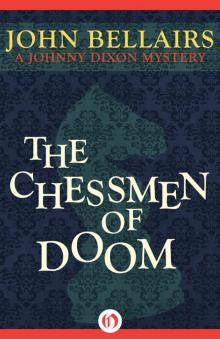 Chessmen of Doom
Chessmen of Doom Secret of the Underground Room
Secret of the Underground Room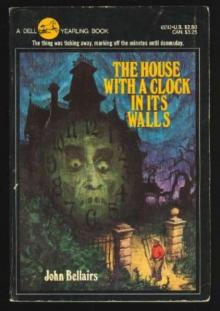 The House With a Clock in Its Walls
The House With a Clock in Its Walls The Vengeance of the Witch-Finder
The Vengeance of the Witch-Finder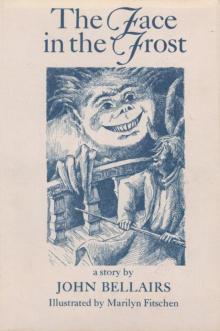 The Face in the Frost
The Face in the Frost Revenge of the Wizard's Ghost
Revenge of the Wizard's Ghost Spell of the Sorcerer's Skull
Spell of the Sorcerer's Skull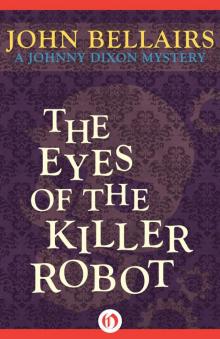 Eyes of the Killer Robot
Eyes of the Killer Robot Mummy, the Will, and the Crypt
Mummy, the Will, and the Crypt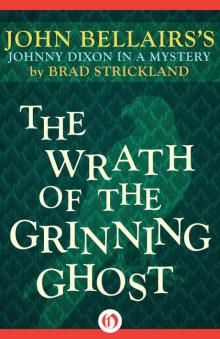 Wrath of the Grinning Ghost
Wrath of the Grinning Ghost The Mansion in the Mist
The Mansion in the Mist The Doom of the Haunted Opera
The Doom of the Haunted Opera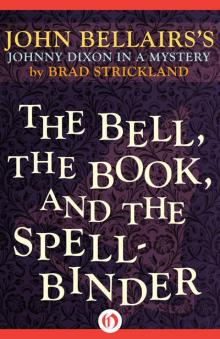 The Bell, the Book, and the Spellbinder
The Bell, the Book, and the Spellbinder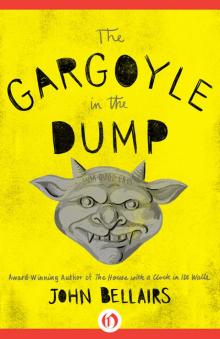 The Gargoyle in the Dump
The Gargoyle in the Dump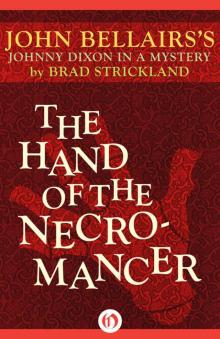 The Hand of the Necromancer
The Hand of the Necromancer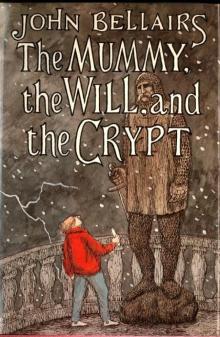 The Mummy, the Will, and the Crypt
The Mummy, the Will, and the Crypt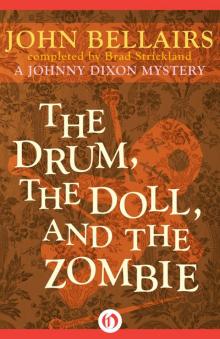 Drum, the Doll, and the Zombie
Drum, the Doll, and the Zombie The Specter from the Magician's Museum
The Specter from the Magician's Museum The Letter, the Witch, and the Ring
The Letter, the Witch, and the Ring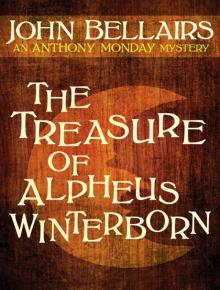 The Treasure of Alpheus Winterborn
The Treasure of Alpheus Winterborn The Dark Secret of Weatherend
The Dark Secret of Weatherend The Figure in the Shadows
The Figure in the Shadows